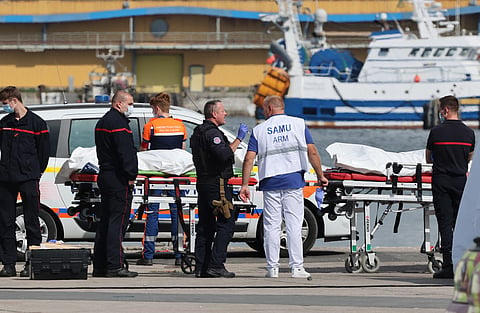

The number of irregular migrants crossing the Channel to Britain in small boats in 2024 soared by a quarter compared with the previous year, government data showed Wednesday.
The steep rise highlights the challenge facing Prime Minister Keir Starmer, who swept to power in July and has pledged to crack down on the dangerous journeys.
Some 36,816 people were detected in the Channel last year, a 25 percent jump from the 29,437 who arrived in 2023, provisional figures from the interior ministry showed.
The total, however, was still well below the record 45,774 undocumented migrants who arrived on the UK's shores in 2022.
Migration to Britain, irregular and regular, was a major issue at last summer's general election, when Labour returned to government after 14 years in opposition.
Upon entering office, Starmer scrapped the previous Conservative government's controversial scheme to send the irregular migrants to Rwanda.
He branded it a "gimmick" and called it "dead and buried" during his first press conference as prime minister.
Starmer has pledged to "smash the gangs" of people traffickers running the crossings and has signed a number of agreements with foreign countries to co-operate on law enforcement.
In December, Britain and Germany signed a joint action plan aimed at tackling the smuggling gangs, while the interior ministers of Belgium, France, Germany, the Netherlands and Britain held talks to boost cooperation.
In November, Starmer described smuggling networks as a "global security threat similar to terrorism".
In the first nine months of last year, Afghan migrants accounted for the single largest group of arrivals, making up 17 percent of the total. People from Vietnam, Iran and Syria were the next largest groups.
Vietnamese migrants appeared to fuel the surge in crossings in 2024. They made up just five percent of arrivals in 2023, well below the January-September 2024 figure of 13 percent.
The figures mean last year had the second highest number of annual arrivals since data on the crossings began to be collected in 2018.
Starmer is also under pressure to reduce legal migration as he tries to fend off growing support for arch-Eurosceptic Nigel Farage's hard-right Reform UK party.
Reform campaigned almost exclusively on slashing migration during the July 4 poll and won roughly four million votes -- an unprecedented haul for a far-right party.
Net legal migration is running at historically high levels, and was estimated at 728,000 for the year to June 2024.
The surge has come despite Britons being told during the 2016 Brexit referendum that leaving the European Union would allow the country to "take back control" of its borders.